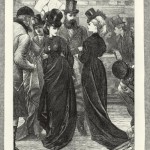Marcus, Sharon. Between Women: Friendship, Desire, and Marriage in Victorian England Princeton University Press, 2007.
I’ve run into yet another snag in the question of, Is BDSM necessarily sexual? And how do we write about people’s sexualities who are very, very different from modern conceptions?
Even the primary sources may not be as reliable as we might think. I’ve always taken for granted that Arthur Munby had little or no interest in vanilla sex, that it was all sublimated into his working-class women fetish. There’s no hint he ever had intercourse in the diaries of him or Hannah Cullwick. However, does that necessarily mean anything?
The question “did the have sex?” is the first one on people’s lips today when confronted with a claim that women in the past were lovers — and it is almost always unanswerable. If firsthand testimony about sex is the standard for defining a relationship as sexual, then most Victorians never had sex. Scholars have yet to determine whether Thomas Carlyle was impotent; when, if ever, John Stuart Mill and Harriet Taylor consummated their relationship; or if Arthur Munby and Hannah Cullwick, whose diaries recorded their experiments with fetishes, cross-dressing, and bootlicking, also had genital intercourse…. one rarely finds even oblique references to sex between husband and wife.
Pg.43
One could add: Did Henry Spencer Ashbee write or compile My Secret Life and just never mention it in his diaries? (I don’t think he did.) And what really happened to T.E. Lawrence in De’era? (Reminds me of a joke in Blackadder, in which a character casually mentions that Oscar Wilde’s homosexuality is actually just a character assassination by a literary rival.) Even in the well-documented cases with primary sources, there’s so much room for uncertainty.
Sharon Marcus’ book about 19th century female relationships argues that “romantic friendship” between women is not just a genteel, Victorian way of saying “lesbian.” Based on her studies of “life writing”, she claims that passionate yet chaste female-female relationships existed as a complementary adjunct to heterosexual marriage. Women were known to and expected to have intense homoerotic relationships, which would develop their feminine qualities. These relationships existed within the “play of the system” of heterosexual marriage, and constituted a separate realm from actual lesbianism as we would define it today.
Marcus provides a lot of examples from diaries and memoirs of intimate encounters between women that apparently never went past first base, if that far. That suggests a remarkable degree of self-restraint. How often did two women slip over that boundary between female friendship and lesbianism? Alternatively, after reading Alan Moore and Melinda Gebbie’s Lost Girls, were Victorian women quietly having orgies in the parlor while their menfolk enjoyed port and cigars in the study?
Who knows? If there was an accepted social realm for intimate relationships between women, that were emotionally intense yet chaste, then there can be erotics that don’t involve genital contact or even arousal. Munby may very well have gone to the grave a technical virgin even after marrying Cullwick, having perhaps never had an erection in all his interactions with working women.
My personal theory is that Munby was aroused by Cullwick and women like her, but he blocked that out on some level, so he could maintain the pretense, to the world and to himself, that there was nothing improper about his “hobby.” Thus, to him, it wasn’t sexual.
That leaves the even more vexing question of how Cullwick experienced her relationship with Munby. We know that she wrote about flirting with and kissing men other than Munby, so she was more sexually expressive than him (or just less reticent about it.) But was what she felt when kneeling and scrubbing floors pleasure?



